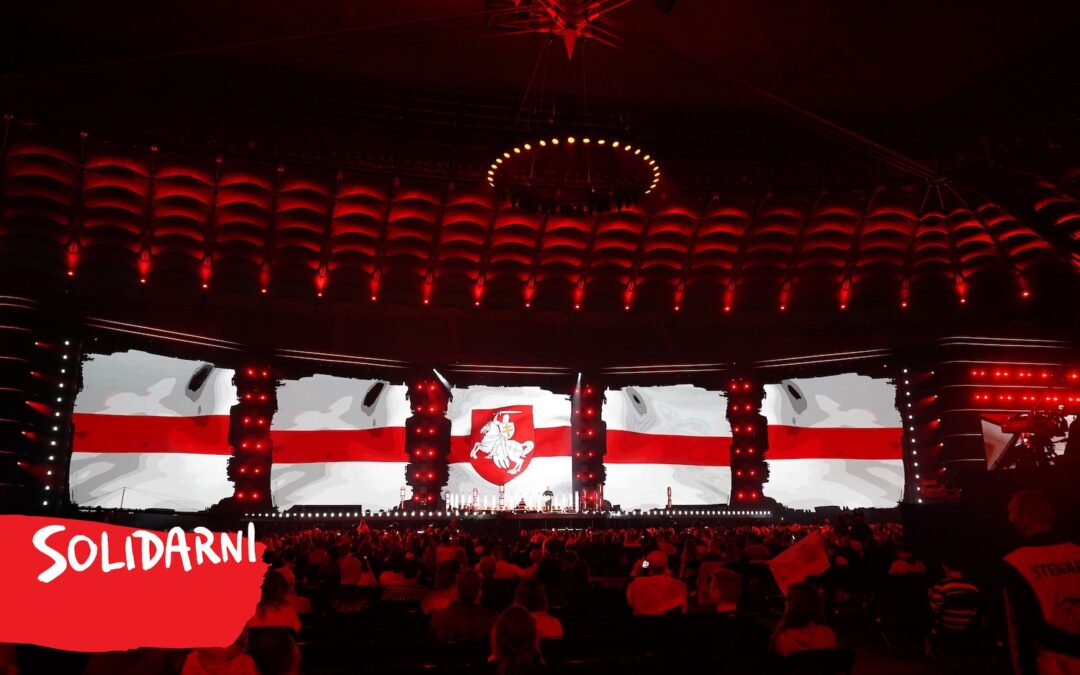A concert of solidarity with Belarus was held this evening at the National Stadium in Warsaw, Poland’s biggest arena, attended by a crowd of thousands.
Organised to express opposition to the violation of human rights and democratic principles in Belarus, the concert featured both Polish and Belarusian performers. It was opened by Poland’s prime minister, Mateusz Morawiecki, who assumed honorary patronage over the event.
#SolidarnizBiałorusia pic.twitter.com/neDkeJTLsQ
— Michał Nowak 🇵🇱 (@Towdiasz) September 26, 2020
The line-up notably featured bands and songs linked to Poland’s own struggle for freedom under communism before 1989. The event began with rock band Chłopcy z Placu Broni performing “Kocham wolność” (I Love Freedom) in both Polish and Belarusian.
Later, Grzegorz Markowski and Darek Kozakiewicz from the band Perfect sang “Chcemy być sobą” (We Want to be Ourselves), a song written in 1981, when Poland was under communist martial law.
“I know what lack of freedom is,” Markowski told Interia. “I saw soldiers with rifles in the street…there was censorship…[It was] a very sad, unpleasant, dramatic and even traumatic feeling.”
When performing “Chcemy być sobą” in the 1980s, the band sometimes changed the lyrics to the similar-sounding “Chemy bić ZOMO”, meaning “We want to beat ZOMO” – a reference to the paramilitary police force used by the communist authorities to brutally suppress protests.
Among the Belarusian artists on stage was musician Zmitser Vaitsyushkevich, who performed a Belarusian version of the Polish song “Mury”. It was once the anthem of Poland’s anti-communist Solidarity movement and has since been revived as a protest song in Belarus.
The concert was broadcast live on Belsat, a channel aimed at Belarus but based in Poland and funded by the Polish government, and Polsat, a private Polish broadcaster.
“Culture has always been an important element supporting all social movements,” Nina Terentiew, program director of Polsat, told Interia.
The event was also accompanied by a fundraiser – organised by two Polish NGOs, the Free Belarus Initiative and Belarusian House Foundation – to support Belarusians in achieving peaceful change and to provide legal, medical and food assistance to victims.
Artists from #Poland and #Belarus on one stage during the concert at the @PGENarodowy stadium.⁰Music unites! #SolidaritywithBelarus ✌️ pic.twitter.com/IEJha83NvA
— Chancellery of the Prime Minister of Poland (@PremierRP_en) September 26, 2020
“Today, the National Stadium connects Poles with the Belarusian nation,” said Prime Minister Morawiecki, opening the concert. “Belarusians have the right to live in a free state.”
He noted that Poland is this year marking the 40th anniversary of the birth of the Solidarity trade union, which led a movement that helped to bring down communism.
“Back then Poles had the courage to say ‘no’ to those who violated human rights, civil rights, and trampled freedom,” said Morawiecki. “Today the Belarusian people are fighting for their freedom; we want to be together with them on their path.”
Jestem tu by okazać wsparcie i solidarność. Koncert #SolidarnizBiałorusią. #MuzykaDlaWolności 🤍❤️🤍 #WolnaBiałoruś pic.twitter.com/euyYljaHA0
— Michał Szczerba (@MichalSzczerba) September 26, 2020
A leading member of Poland’s opposition, Michał Szczerba, tweeted from the concert that he was “here to show support and solidarity”. A “free Belarus needs us…Let’s not fail, Poland,” wrote Szczerba, who was in Belarus last month at the invitation of the country’s opposition to observe the elections.
Pavel Latushko, a member of the Belarusian Coordination Council that is seeking a democratic transfer of power, also spoke on stage.
“I would like to thank Poles for their support and solidarity with the Belarusian people in these difficult times,” he said, quoted by Polsat News. “It is wonderful that Poles remember from their history how important solidarity is.”
The Polish government has been active in expressing support for the Belarusian opposition, who are protesting President Alexander Lukashenko’s proclaimed re-election last month amid widespread evidence of vote rigging.
Earlier this month, Belarusian opposition leader Sviatlana Tsikhanouskaya met Morawiecki in Warsaw, where the Polish prime minister handed her the keys to a building in the city for the use of the Belarusian opposition.
Poland has also sought to encourage EU allies to take a stronger stance on Belarus, including offering financial support if the country undergoes a democratic transition.
The Polish government’s actions – which also have the support of most opposition parties – have led Lukashenko and the Kremlin to accuse them of seeking to illegitimately interfere in Belarus’ internal affairs.
Main image credit: PGENarodowy/Twitter

Juliette Bretan is a freelance journalist covering Polish and Eastern European current affairs and culture. Her work has featured on the BBC World Service, and in CityMetric, The Independent, Ozy, New Eastern Europe and Culture.pl.




















